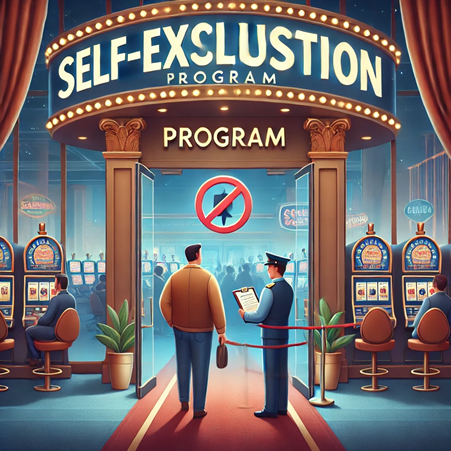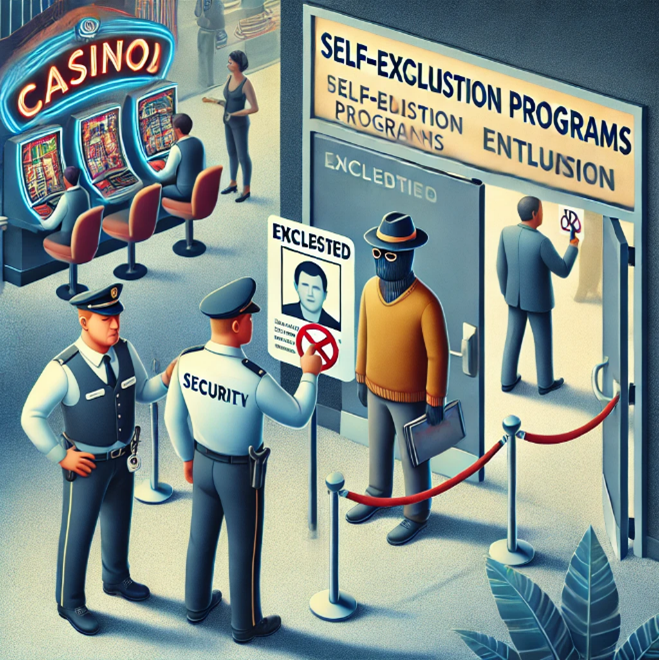Effectiveness of self-exclusion programs in Casino

Effectiveness of self-exclusion programs in Casino
by Nathaniel 04:44pm Jan 20, 2025

Effectiveness of self-exclusion programs in Casino
Self-exclusion programs in casinos are widely regarded as an important tool in addressing problem gambling. These programs allow individuals to voluntarily ban themselves from entering a casino or participating in gambling activities for a specific period or indefinitely. While these programs are an essential component of a casino's social responsibility efforts, their effectiveness can vary depending on several factors. Here's a detailed review of the effectiveness of self-exclusion programs in casinos:
1. Immediate Benefits of Self-Exclusion Programs
Temporary Relief for Individuals: Self-exclusion offers individuals a clear and immediate method to distance themselves from gambling, providing a “cooling-off” period. For people who acknowledge they have a problem but lack the willpower to stop on their own, this period can offer the necessary time and space to reflect on their behavior and seek professional help.
Personal Accountability: By taking the step to self-exclude, individuals are engaging in self-regulation, which can empower them to take ownership of their gambling behavior. This action signals a recognition of the problem and may be an early step toward recovery.
Prevention of Impulsive Gambling: For individuals prone to impulsive behavior or those who gamble excessively in moments of stress, self-exclusion can serve as an effective barrier to impulsive gambling. It helps prevent further losses and may help them avoid more severe financial or emotional consequences.
2. Effectiveness in Reducing Gambling Frequency
Short-Term Effectiveness: Studies have shown that self-exclusion programs can be effective in reducing gambling behavior in the short term. Many participants report a decrease in gambling frequency following self-exclusion. This is particularly true for individuals who are highly motivated to stop gambling and who see the program as a positive first step toward treatment.
Long-Term Effectiveness: The long-term success of self-exclusion programs is less clear. Research indicates that while many individuals experience a reduction in gambling frequency during the exclusion period, a significant number of individuals return to gambling after the exclusion ends, either because they voluntarily lift the ban or because they circumvent it. This suggests that while self-exclusion can be an effective tool for short-term abstinence, it may not provide lasting solutions without additional treatment or support.
3. Challenges in Enforcement and Circumvention
Circumvention of Self-Exclusion: One of the major challenges with self-exclusion programs is that individuals can sometimes find ways to bypass the exclusion. For example, they may use fake IDs, alter their appearance, or gamble at casinos outside the scope of the self-exclusion program (especially if the program is not coordinated across jurisdictions or casinos). Casinos typically rely on security staff to spot banned individuals, but this process is not foolproof, and determined individuals may evade detection.
Lack of Technological Solutions: While some casinos use biometric identification or facial recognition technology to enforce self-exclusion, the implementation of these technologies is not universal. The lack of consistent use of advanced identification systems across casinos means that there can be gaps in enforcement, especially when patrons visit multiple locations or online casinos.
Coordination Between Casinos: In some regions, self-exclusion lists are not shared between casinos, making it easier for self-excluded individuals to visit a different venue without consequence. More comprehensive, multi-casino databases and systems that allow for better coordination are needed for self-exclusion to be more effective.
4. Psychological and Behavioral Barriers
Stigma and Denial: One of the challenges in the effectiveness of self-exclusion programs is the stigma associated with gambling addiction. Many individuals may avoid seeking help or self-excluding because they are in denial about their addiction or fear judgment. As a result, they may not voluntarily enter the program until their situation becomes dire.
Relapse after Exclusion: Even after a self-exclusion period, many individuals may return to gambling due to the underlying psychological and behavioral factors that contribute to addiction. These factors include stress,boredom, or anxiety, which may drive them to seek gambling as a coping mechanism. Self-exclusion may temporarily reduce exposure to gambling, but without proper counseling or behavioral therapy, the root causes of addiction may remain unaddressed, leading to relapse once the exclusion ends.
5. Integration with Other Support Services
Complementary Support:Self-exclusion programs are most effective when combined with other support services, such as counseling, therapy, and participation in support groups like Gamblers Anonymous. Individuals who use self-exclusion in conjunction with professional treatment or peer support are more likely to experience lasting change and recovery.
Referral to Treatment Services: In some cases, casinos may offer self-excluded individuals referrals to problem gambling treatment programs. This integration helps provide a holistic approach to recovery and can significantly enhance the overall effectiveness of self-exclusion programs. However, if self-exclusion is viewed as a standalone solution without access to professional help, its effectiveness in addressing the underlying causes of gambling addiction can be limited.
6. Legal and Regulatory Challenges
Regulatory Oversight:Self-exclusion programs are often implemented by individual casinos or under the supervision of regional gambling commissions, and their structure can vary significantly by jurisdiction. The lack of consistent regulations across different regions can complicate the program’s effectiveness, as the criteria and enforcement mechanisms may differ widely.
Voluntary vs. Mandatory: Self-exclusion is typically a voluntary program,meaning that individuals must take the initiative to enter the program. In some cases, mandatory self-exclusion could be more effective, particularly for individuals who do not recognize the severity of their addiction.However, mandatory programs may face legal and ethical concerns,especially when balancing personal freedom with the need for intervention.
7. Success Rates and Research
Mixed Results from Studies: Research on the success rates of self-exclusion programs is mixed. Some studies show that participants report reduced gambling behavior and improved mental health during or after the exclusion period. However, other research suggests that while self-exclusion reduces ly returning to gambling. A study conducted by the National Gambling Board in South Africa, for example, showed that while self-exclusion helped many individuals stop gambling, a significant number still relapsed.
Barriers to Seeking Help: Even among those who sign up for self-exclusion, many individuals may not fully engage with additional recovery resources or therapy. As a result, self-exclusion alone might not be enough to break the cycle of addiction. A comprehensive, integrated approach that includes counseling and community support is generally seen as more effective.
8. Online Gambling and Self-Exclusion
Online Casino Self-Exclusion: With the rise of online gambling, many self-exclusion programs have extended to digital platforms, allowing individuals to self-exclude from online gambling sites. In some regions, national self-exclusion databases exist for online gambling, which can help make enforcement more effective across multiple online platforms. However, as with in-person casinos, circumvention remains a challenge, as individuals can easily access other websites or even use VPNs to bypass restrictions.
Cross-Jurisdictional Challenges: Online self-exclusion is complicated by the fact that many online gambling sites are based in other countries or jurisdictions.This creates a challenge for ensuring that an individual’s self-exclusion is effective across all platforms.
Conclusion:
Self-exclusion programs can be effective tools for individuals looking to manage or reduce their gambling behavior. They provide a structured way for people to distance themselves from gambling and can be an important first step toward recovery. However, their effectiveness is influenced by several factors, including enforcement challenges, the willingness of participants to follow through with the program, and the support provided by additional treatment services.
To enhance the effectiveness of self-exclusion programs, it is essential to integrate them with other addiction treatment resources, improve enforcement measures (such as facial recognition and cross-casino coordination), and reduce the stigma surrounding gambling addiction. Combining self-exclusion with counseling, peer support, and a holistic approach to addiction recovery will increase the likelihood of sustained recovery for individuals struggling with gambling addiction.






